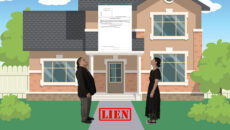This article critiques the popularly held notion that homeownership is a lucrative investment.
A tale of two dollars
It should come as no surprise in the current economic climate to hear that a professor of economics does not consider a home purchase to be a lucrative investment. But the assertion that purchasing a single family residence (SFR) has never been a sound investment could come as a shock to a nation that has always believed in the myriad virtues of homeownership — not the least of which has been the idea that if all else fails a profit may be turned by selling their home.
Robert Bridges, a professor of economics at the University of Southern California, points out that between 1980 and 2010, the value of a mid-tier SFR in California increased by an average of 3.6% per year, from $99,550 to $296,820, not much greater than the rate of consumer inflation. Thus, even those mid-tier California homes that were sold during the most recent market peak in 2007 show a moderate average annual price growth of 6.61%.
A comparison of the appreciation between a dollar invested in California housing versus the same dollar invested in the Dow Jones Industrial Index (the Dow) is quite revealing in terms of the viability of the relative investments. Given the average annual price growth of mid-tier California housing, one dollar invested in the California housing market would have grown to a peak value of $5.63 in 2007 and to $2.98 in 2010. The same dollar invested in the Dow, which to some extent ran in tandem with the vicissitudes of the California housing market, would have been worth $14.41 in 2007 and $11.49 in 2010.
Relative rates of return on dollar to dollar investments is one thing, but what of the popular perception that paying-off a home mortgage provides long-term financial security for those who own California real estate outright? While a home can function fine as a long-term piggy bank, it is one of the most notoriously illiquid assets one can own, a risk acutely evidenced by today’s real estate market. [For more information on homeownership as an integral aspect of the American dream, see the July 2011 first tuesday article, Like myths, this old dream will never die.]
Do you consider homeownership a lucrative investment? Total Voters: 67
The illiquidity syndrome
In order for a homeowner’s 100% equity interest in a piece of California real estate to make a difference in their spending power or practical wealth, they would have to take out an equity line of credit or reverse mortgage (or sell their home leaving them to rent their shelter). The problem is, equity lines of credit are expensive and for every dollar pulled from equity the home owner could end up losing twenty cents, which exponentially diminishes the return on the homeowner’s dollar.
Without the phenomenon of an unsustainable real estate market boom, purchasing a home is tantamount to investing your money in a piggy bank. [For a snapshot of the cyclical nature of the California real estate market, see the July 2011 first tuesday article, California tiered home pricing.]
Betting on a real estate market boom is never sound fiscal reasoning. As the old adage goes, what booms must go bust, so it is not enough to simply hope your home value will sky rocket, but one must be prepared to capitalize on the boom moment if you consider your home an investment.
This means selling at the right time and replacing your housing once your asset has been liquidated. However, purchasing a replacement home when prices are inflated would be not be an investment at all, since you simply change properties and gain nothing through the exchange.
Matching rhetoric to reality
The notion that homeownership is an income-producing endeavor is at odds with the reality of such an “investment.” When rising prices rapidly replicate like a virus on steroids, this runs counter to the other fundamental attraction of homeownership — its stability. The only time — allow us to repeat for appropriate emphasis — the only time homeownership produces dividends beyond the rate of inflation is during a boom cycle, which of course is the variable in the homeownership equation that renders it unstable.
When the California real estate market reaches equilibrium, as it seems it will approaching 2012, home values will only rise at or near the rate of consumer inflation for several years, well into 2016. Again, this renders homeownership outside the confines of booms and busts as a net-zero investment – no real gains after accounting for inflation’s damage to the dollar’s purchasing power.
It is time to do away with the tired old rhetoric espoused by housing ideologues (interpret: builder and broker trade unions) that purchasing a home is a good investment and call it what it is: shelter. [For more information about the luxury vs. necessity debate, see the October 2010 first tuesday article, Is homeownership a luxury or a necessity?]














Bravo to Rob Arnold for his excellent, detailed report and to the rest of the people responding to this article.
My comments are more anecdotical in nature and come from the words of my Mother. She was a young adult during the Great Depression and often told me later in life that the people who were able to hold onto their homes during that time were the one’s considered wealthy when it was over. She had a special fondness for real estate and purchased various rentals even though she wasn’t wealthy. Most of her properties were “fixers” because that’s all she could afford. She bought over time (called dollar cost averaging in investing lingo) and rented them out. Maybe it’s in the blood because I’ve always had an interest in buying rental properties–over time. Thanks to my purchases I was able to retire before I was 60. My mother peacefully passed away recently following a wonderful life and I became the beneficiary of her real estate investments.
The question you posed in your title of “home ownership” as an “investment” was a little confusing to me as opposed to “real estate” as an “investment.” But the elements (long term appreciation, ability to generate income, owning an actual asset-a commodity if you will) doesn’t change if the real estate is rented or owner occupied. In fact, that’s an additional option over stocks and bonds–you can’t live in a stock.
The authors of these articles have never worked a day in real estate or finance — they just write about it from a third-party perspective.
You can call it as you may want, the fact that we all need a roof over our heads beats anything… And let alone if you do buy a property, after you pay it off you may get at least some of your money back… Anyone is entitled to do what they want with their money, be aware of all the ” good intentions” out there…you don’t need a financial degree to understand that you need to buy when the prices are lower than the rent…
Let’s review the ‘facts’ one more time:
If you buy a home and it rises not one penny more than inflation over thirty years, then inflation is “neutral”. But a hedge that keeps pace with inflation is hardly neutral compared to not keeping pace. Most stock market investors are unable to stay the course and sell at the wrong time – and lose money. Some hedge that is! But the index sure look good, huh!
If you pay not one penny more on the mortgage and expenses than rent would be on the same house, then living expenses are neutral. But mortgage interest and property taxes are tax-deductible, and currently LESS than rent on the same house even before taxes are considered.
If the house is finally paid off and then is either:
a) rented for rising income or
b) lived in without a mortgage payment, and
c) continues to hedge for inflation either way.
Then:
You don’t think owning is a more effective long term investment vs renting?
You don’t think having rising equity beats having no equity?
You don’t think a fixed mortgage followed by no mortgage is better than endlessly rising rents, as debased paper currency always leads to???
You don’t think advising a buyer’s strike, when prices and interest rates are at their lowest point, is against a young person’s interests?
You don’t think the agents who make up your clientele disagree with your analysis, or else they’d leave the business? In fact, thanks for encouraging these defections. It will help my business. Will it help yours?
I need to remain open to viewpoints unfavorable to my interests, and my clients’ interests. But such viewpoints first need to survive a reality check.
The current Seller’s Armageddon is simultaneously the best Buyer’s market perhaps ever. To pretend otherwise when prices have dropped to 25% of what they were in some places, while rents have gone UP…is uneducated. A glaring red flag coming from a continuing education organization.
Why would you NOT emphasize the few positives the industry does have to your beleaguered client base??
I can’t emphasize enough how refreshing many of the 1st Tuesday articles are, including ones I disagree with part of. But on this paramount issue of the value to buyers of buying at THESE prices and THESE rates, you cannot afford to be among the lumpen uneducated. Provided, of course, that people obtain FIXED mortgages at payments within their means and forget the word REFINANCE. A home is NOT a piggy bank.
The ethical agent earns an ethical commission by getting buyers into these houses subject to the above terms. If you want to be on a pulpit, THAT is the right pulpit to mount.